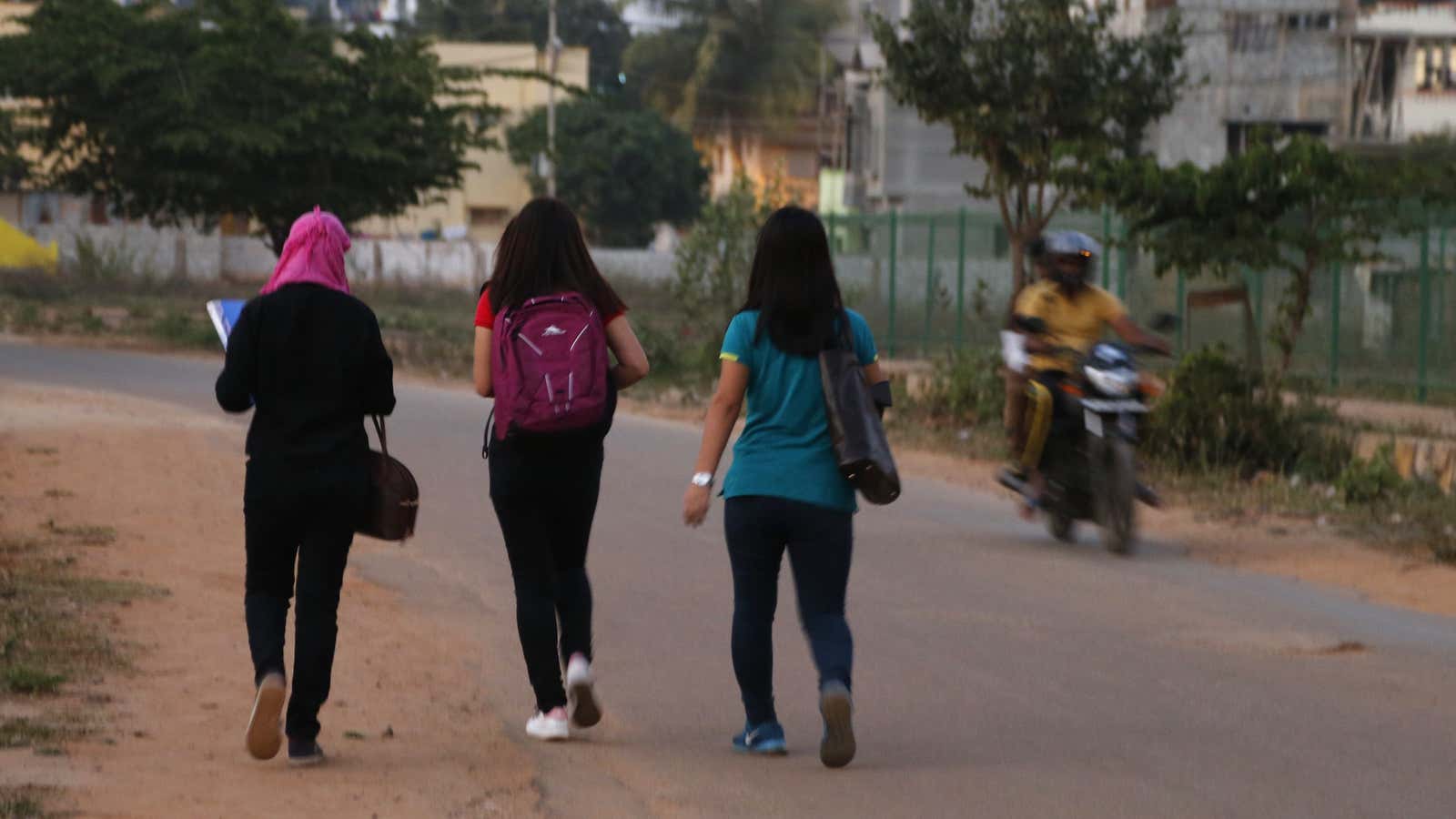This year marks a decade since my family moved to Bangalore.
On our arrival, in 2007, the city was still known more for its green gardens than its tech startups, but of course that changed soon enough. And with that change came its steady transformation into a mega metropolis, luring even more migrants from across the country with the promise of more jobs, better jobs.
Today’s Bengaluru shows all the glittering signs of economic progress: Indians and expats making money and spending it well, often inside gargantuan shopping malls filled with foreign brands. Buzzing bars and restaurants are packed with people, young and old; a hipster coffee revolution is brewing, and the likes of Uber, Paytm, Swiggy, and more have already made life casually cash-free for a large part of the urban population.
In many ways it’s young women like me who have benefited the most from these changes. You’ll see us all over Bengaluru’s trendy neighbourhoods, dressed in the nice clothes we paid for ourselves with our first salaries and thoroughly enjoying our risottos or tacos, comfortable in the knowledge that getting home late at night is easier now, thanks to Uber and Ola.
In fact, standing in some parts of the city, like the Indiranagar neighbourhood at around 10.30pm at night, you can almost convince yourself that India has finally made it to that cosmopolitan, progressive ideal: men and women, equal and thriving, splitting the bill at a restaurant because we can.
But as recent events have proved, that ideal is nothing more than a bubble.
As the new year dawned on Bengaluru, scores of women were assaulted and molested by a mob of unruly, drunken men in an event that will probably go down in history as the city’s “night of shame.” Alarming photographs show female revelers crying on the shoulders of overwhelmed police officers, 1,500 of whom were deployed in advance to prevent just this sort of thing from happening.
It turns out that for all its social and economic changes, its signs of prosperity, Bengaluru is still no safe haven for women. We shouldn’t be surprised, of course, for the data shows that crimes against women have been on the rise for years. In 2013 itself Bengaluru recorded the most number of such cases out of all the major south Indian cities and the situation has only worsened since then.
In 2015, data from the National Crime Records Bureau showed that Bengaluru City registered 3,029 cases of crimes against women, ranking third in the entire country.
For long-term residents, these statistics prove that the city has become almost unrecognisable, a world away from where they grew up.
“Bangalore was much safer before,” said Shweta Gopal, a software engineer who has spent all her life in the city. Twenty years ago, the 35-year-old says, she would walk back home from classes late at night without any kind of fear.
Even younger generations can attest to what a difference just a few years have made.
“I haven’t experienced anything this untoward before,” Reshmi Shekhar, 24, said. “There has been the indecent gaping and verbal (abuse), but I never feared for my safety.” Shekhar recalls passing Brigade road on the night of Dec. 31, 2016 and being shocked by the sheer number of leering, drunken men, far more this year than ever before.
The incident has naturally sparked an outcry, with locals vowing to take to the streets to push back against a culture that persistently excuses home-grown misogyny and patriarchy, blaming “tempting” clothes and the influence of the West instead. And therein lies the sure-shot sign that the real problem is not that things have changed but rather that they haven’t, not completely.
Urban Indian women have changed but the archaic concept of the ideal Indian woman hasn’t: women are still largely restricted to two major roles in India’s society, that of the wife and that of the whore, and in both cases their rightful place in public space is often a matter for men to decide.
This becomes clearer when you look at the response from Bengaluru’s own ministers and police, who played down the incident at first because apparently it wasn’t enough that multiple women attested to being groped and mauled. They must have asked for it, these men said in response, by leaving the confines of their homes, and that too at night.
As the news of the incident has spread around the world, the gloss of India’s Silicon Valley has worn off a little. And maybe that is what we needed all along, a timely reminder that all the money in the world can’t buy you equality or respect.
We welcome your comments at ideas.india@qz.com.
